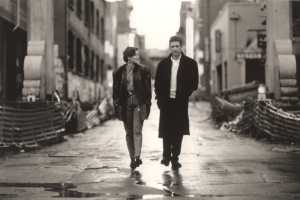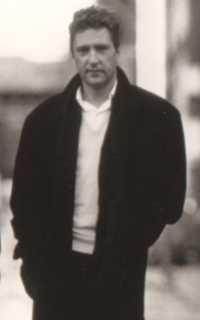NOT JUST WET, BUT DRIPPING By: Paul Byrnes.
19th October 1988. Sydney Morning Herald
Boulevard of Broken Dreams is the tearful story of Tom Garfield, a hugely successful expatriate writer who comes home to Melbourne determined to reunite his broken family. And when I say tearful, I mean tearful.
John Waters, as Garfield, gets right into sobbing in the first reel, standing on the roof of his Melbourne hotel at sunset, before we have any idea of why he is so unhappy.
Each of the main characters follows suit, except for his old writing pal, Ian, played by Kim Gyngell, who is the only resilient, and therefore likable, character.
The tears are indicative of the film's monotonous, prodding style. There's no modulation of emotions here. When someone is sad, they cry. I know Melbourne is wet, but this is ridiculous.
It's hard to believe Tom Garfield's greatness as a writer because he's so emotionally shrivelled. His play, The Human Heart, is on in Melbourne when he arrives, but you wonder what he could possibly know about the subject.
He is back after 10 years in the US, the last three separated from his wife and child. He's determined to get them back and he does it with typical self-centredness. You never get the feeling that it is out of regard for them
It's just that he's lonely and bitter, feeling mortal. The day he stopped drinking was the day he stopped writing and now he needs another crutch.
Apart from being selfish, Garfield's also self-important, mockingly cynical and self-pitying. He keeps wandering through the wet Melbourne streets looking soulful in a dark overcoat. These scenes aren't emotional, they're just imitations of emotion, a lazy, cliched movie shorthand.
Why should we care for this man? When he gets beaten up by some bouncers at a St Kilda clip joint, I was secretly applauding the toughs. Sink the slipper in, boys, I thought. Give him something to really feel sorry about.
Without giving us any reason to feel for him, the movie has no heart. We can't see why Helen (Penelope Stewart) would even contemplate going back to him. She's living in a dry, polite relationship with Jonathon (Andrew McFarlane), a man who's stable but boring. Their home is tasteful and spiritless, like the pages of a furniture catalogue, but even he seems preferable to the manipulative, puny Garfield.
McFarlane has the one really touching scene in the movie when he realises he may be losing Helen and her daughter, Jessie (Jacinta Stapleton). His face contorts, trying to maintain some dignity, as he realises how barren her life with him must be. Suddenly, we connect with an emotion that's worth a tear or two, but it doesn't last.
A movie like this should rub you raw with its family conflict, but this one left me feeling embalmed. It's prettily photographed, but like a commercial, and it has about that level of emotional development.
Frank Howson's script is full of portentous lines like "we behaved badly in the Garden of Eden" - but Pino Amenta, whose first feature this is, makes these lines sound even worse by taking them seriously.
John Waters won an AFI Award last week for his performance, as did Kim Gyngell, playing his grubby friend, a writer whose failure to get published has given him a charming fatalism.
Their scenes together are the best in the movie, because Ian allows Garfield to stop feeling sorry for himself, to show his human side. If the film had just been about these two, it might have been worth making.


